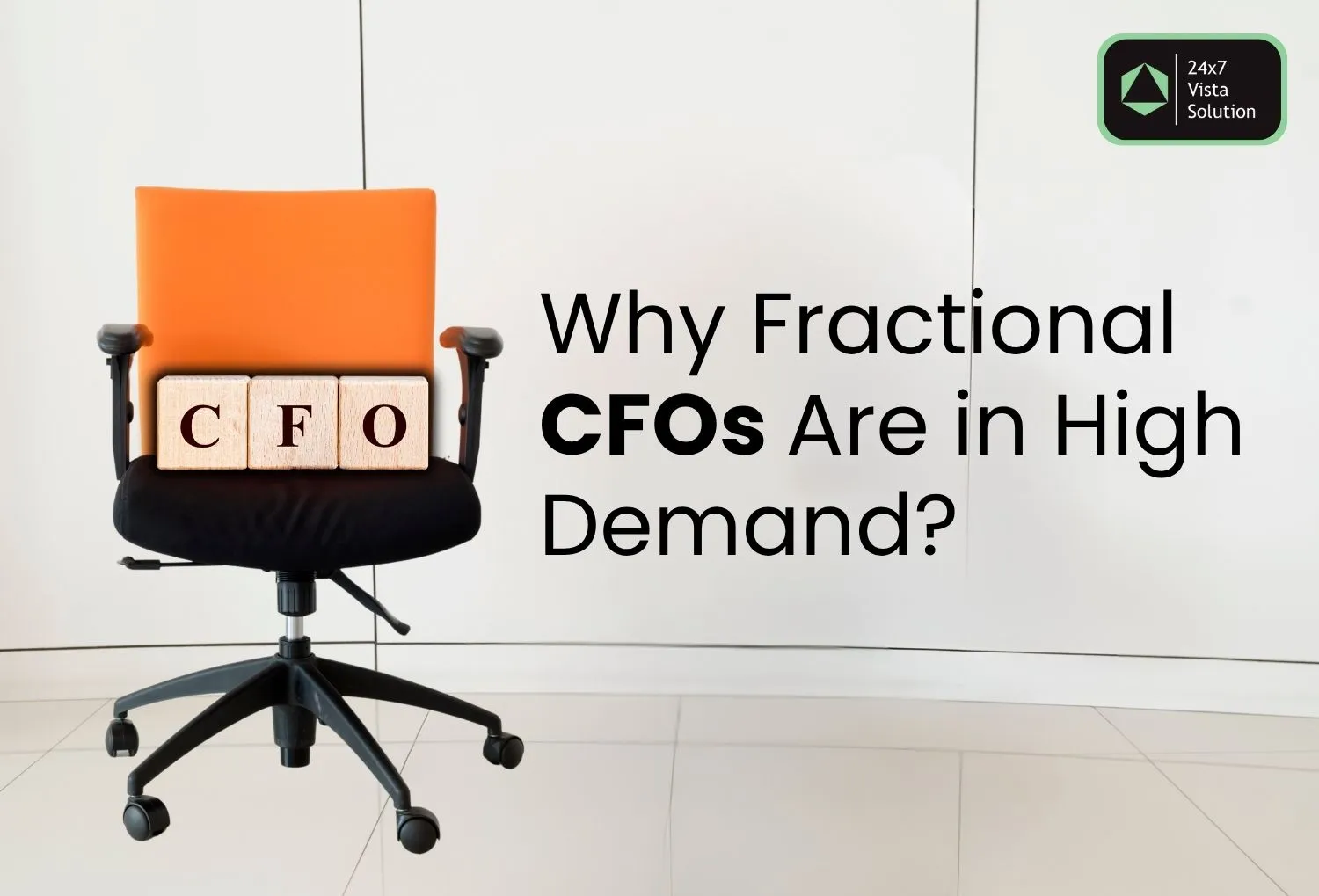Ever heard the term fractional CFO and wondered what’s all the buzz? Picture your finance leadership—not as a full-time hire, not as a temporary fill-in—but as a strategic, flexible resource you can tap into exactly when your business needs expert financial guidance. That’s the beauty of fractional CFO services, and in today’s fast-paced business world, more companies are leaning into this model.
Maybe you’re a startup on the brink of your next growth stage, a scaling SaaS company eyeing Series B, or a mature business in need of smart oversight without the commitment—or cost—of a full-time CFO. Wherever you are, the rise of fractional CFOs is reshaping how smart businesses handle financial leadership. Let’s dive in and explore why.
What Are Fractional CFO Services?
Defining a Fractional CFO
An experienced finance professional who works for a company on a project or part-time basis instead of full-time is known as a fractional CFO.
In reality, this implies that the CFO may work on your company for a set number of days or hours each week, or they may fill in for particular tasks (such as system deployments or fundraising).
Importantly, you’re just paying for the time you require, even though you’re receiving an experienced CFO, who is frequently someone who has overseen finance at other businesses.
In short, they bridge the gap between startups needing structure and larger companies needing agile, expert leadership without the high overhead.
How Fractional CFOs Differ from Full-Time and Interim CFOs
It’s important to know what’s unique about fractional CFO services compared to full-time or interim CFOs.
- Full-time CFO: Permanent hire, fully integrated team member, high compensation, equity expectations, long-term commitment.
- Interim CFO: Interim CFO services are generally short-term based. They typically serve during transitions (like mergers or leadership gaps), often reactive rather than proactive, fixed temporary tenure.
- Fractional CFO/Part‑time CFO: This CFO focuses on strategic, part-time expertise. You get senior-level guidance tailored to your current stage and budget, with flexibility and intentionality—ideal for scaling smartly.
When Should a Business Consider Outsourced CFO Services?
Consider fractional CFO services when:
- You’re growing fast, but not ready to hire a full-time CFO yet.
- You’re preparing for raises, M&A, or large financing events.
- Cash burn, margins, or forecasting models are weak, and you need structure.
- You need systems and reporting, but not a full-time hire.
- You want strategic finance guidance—but only as needed (e.g., quarterly board decks, monthly analytics).
Put simply, when financial complexity grows but it’s not time (or budget) for a full-time CFO, fractional CFOs often fit the sweet spot.
The Rise in Demand for Fractional CFOs in 2025
Financial Challenges in a Post-Pandemic Economy
The pandemic reshaped finances for businesses everywhere. Now, in 2025, companies are still dealing with supply chain disruptions, inflation pressure, labor shortages, shifting consumer behavior and the list goes on.
- Poor cash management: It is a major reason why businesses fail,” noting factors such as insufficient forecasting and a lack of contingency planning.
- Domain-specific knowledge: Organizations want CFOs that possess domain-specific knowledge based on extensive knowledge in their domain of application, e.g. SaaS or healthcare; not all fractional CFOs have that. Framing and careful filtering is critical.
- Business knowledge: Since fractional CFOs need to quickly assess different aspects of a company to mitigate risk, they must be able to hit the ground running or hit the ground running to a set of clear agreements, objectives or goals.
- Availability and timelines: Availability between a CFO and your business can be difficult to align, especially when time zones are different or workload requires one to schedule ‘non-working hours’.
- Communication skills: Enabling collaboration comes down to communication; fractional CFOs need to collaborate with their colleagues in their leadership team, even though these persons are not full-time employees.
- Cost vs. skills: Fractional CFOs can be an economical solution, but companies need to ensure that their fractional CFO suppliers will be offering high-value knowledge contribution. Costs for simple fraction CFO arrangements range from $4.5/hour and $500/hour which means a thorough appraisal is necessary for their performance.
Growing Popularity in SaaS and Startup Ecosystems
Take SaaS startups: they have subscription models, CAC (customer acquisition cost), LTV (lifetime value)—metrics that don’t fit traditional accounting. Finance needs to speak product, customer, and growth cycle. Fractional CFOs with SaaS experience (sometimes called “SaaS fractional CFOs”) are now a go-to.
They’re also more cost-effective than permanent hires that come with equity, benefits, and overhead. A fractional CFO brings high-level experience—without the long-term burden.
Trends Driving the Shift to Flexible Finance Leadership
- On-demand specialization: Need help only quarterly or around major events.
- Gig economy influence: Fractional execs mirror freelance models—plus with boardroom-level experience.
- Remote acceptance: Teams are comfortable collaborating virtually; CFOs don’t need to be onsite full-time.
- Talent shortages: Skilled CFO-level professionals are scarce and expensive. Sharing one across several companies using fractional models is becoming a smart workaround.
Key Benefits of Hiring a Fractional CFO
1. Strategic Financial Forecasting and Planning
A CFO is essential in financial forecasting, ensuring that companies have a clear financial strategy for future funding requirements and growth issues. A fractional CFO may generate a thorough forecast that includes revenue and operating expenditures, allowing founders to prepare for future financial needs and get money without unnecessary delays. Early financial planning allows you to detect and minimize risks before they become serious issues, maintaining financial stability even in unpredictable times. This proactive approach enables businesses to reduce capital withdrawals and achieve financial sustainability.
2. Improved Cash Flow Management and Cost Controls
Startups frequently have cash flow challenges, that may result in failure. A fractional CFO can assist in the development and maintenance of a cash flow management system, including forecasting cash inflows and outflows.
This guarantees that the firm has enough funds to meet short-term needs without overspending on long-term initiatives.
Careful cash flow management can help avoid funding problems that could affect the company’s viability, as entrepreneurs sometimes underestimate the need to manage cash flow from the beginning.
3. Better Risk Management and Compliance
Entrepreneurs frequently miss financial issues during business startup, resulting in costly mistakes such as tax mishandling and regulatory compliance failure. A fractional CFO may assist companies with navigating difficult financial and legal issues while also guaranteeing compliance with tax and payroll rules. This preemptive approach can help the company avoid costly fines, legal challenges, and reputational damage, all of which could have a detrimental impact on its future. By tackling these concerns early on, entrepreneurs can avoid big problems and keep their companies on the proper financial track.
4. Faster Decision-Making with Data-Driven Insights
Boards, investors, and exec teams want fast, sharp, reliable financial insight—no compromises. Fractional CFOs deliver nimble dashboards and real-time reports so decisions are rooted in data, not hope. That speed and clarity can take performance to another level.
5. Scalability
Startups encounter financial hurdles as they expand, needing careful planning and adapting to market shifts. A fractional CFO can help firms develop by ensuring that financial infrastructure scales with operations. They construct robust procedures, form a strong team, and deliver cost-saving insights, laying the groundwork for long-term success while balancing short-term demands with growth objectives.
Where Fractional CFOs Add Value
Top-of-Funnel: Early-Stage Startups Needing Financial Discipline
Early-stage companies do everything by gut instinct—and that’s powerful. But lack of structure can bite later. A fractional CFO helps:
- Set up basic finance infrastructure.
- Define KPIs.
- Introduce accounting and budgeting best practices.
- Prepare the company for its first big round of funding or growth splurge.
Those early years benefit greatly from strategy to systems, however, not at full-time cost.
Middle-of-Funnel: Scaling Companies Looking to Raise Capital
Once revenue hits mid-seven figures, the stakes get real. Investors, forecast variance thresholds, burn rates, and valuations matter more. Here’s where a fractional CFO shines:
- Build investor-ready financial models.
- Run sensitivity analyses.
- Support due diligence.
- Level-up reporting rhythms and audit trails.
They become key architects of fundraising strategy—even without permanent roles on the org chart.
Bottom-of-Funnel: Mature Businesses Needing Expert Oversight Without Full-Time Commitment
Suppose you’ve lost your CFO, or operations are highly regulated, or you’re moving into M&A or restructuring. Hiring full-time might just be too slow—or politically risky. So companies lean into fractional CFO services:
- Plug high-level leadership gaps short-term.
- Oversee processes, audits, or complex internal restructure.
- Stabilize operations and financial planning.
- Do it all efficiently—without a long-term hire.
Who Needs Fractional CFO Services?
SaaS Companies with Rapid Revenue Growth
SaaS financial models are all about churn, ARR, MRR, CAC, LTV — numbers you can’t fudge. A SaaS fractional CFO knows where to find those numbers, how to interpret them, and how to steer using them.
They can help:
- Deep dive into product-level unit economics.
- Improve GTM performance.
- Forecast funding need.
- Pivot quickly based on subscription trends.
Businesses Going Through M&A or Fundraising Rounds
Selling, buying, merging, or raising money? Fractional CFOs are expert navigators:
- Build deal financial models (e.g., IMs, carve out P&Ls).
- Oversee due diligence, and evaluate valuation assumptions.
- Collaborate with legal, accounting, tax, and field experts.
- Ensure deal cycles run clean and timely.
Companies in Turnaround or Financial Restructuring Scenarios
Underperforming divisions? Too much debt? Flatlining revenue? Raise a red flag, and call in a fractional CFO:
- Deep cost and profitability diagnostics.
- Cash recovery plans.
- Communicate with lenders, and restructure debt.
- Implement live variance tracking.
- Track progress monthly for stakeholders.
Non-permanent but executive-level guidance is perfect for restructuring—but without long-term expense.
Cost Comparison: Fractional CFO vs Full-Time CFO
What Does a Fractional CFO Cost?
Fractional CFO salary ranges from £20,000 to £96,000 yearly. They rarely take equity, unlike full-time CFOs who expect stock. Full-time CFO salaries in the UK are typically £150,000 – £200,000 yearly, plus benefits.
Value vs Cost: ROI of Fractional Engagements
Yes, fractional CFOs are not exactly affordable—but ROI is often 3×–5×:
- Keep better control of the burn, saving hundreds of thousands a year.
- Steer slower growth with smarter decision-making.
- Ensure smooth valuation improvements before capital raises.
- Reduce finance error risk—money not lost in audits, regulatory fines, or bad forecasts.
When done well, fractional CFOs pay for themselves—and then some.
Factors That Influence Pricing
Pricing depends on:
- Scope: Is it strategy-only, or heavy system implementation?
- Industry: SaaS, manufacturing, and healthcare—all have different financial complexity.
- Financial structure: Single entity? Multiple (e.g. subsidiaries)? Foreign currency? M&A in flight?
- Engagement length: Blocks vs ad‑hoc hours.
- Level of involvement: Are they board-facing and strategic, or task-focused?
Clear scoping up front leads to clearer costs—and clearer results.
Choosing the Right Fractional CFO Partner
Qualities to Look For: Experience, Tech Fluency, Industry Fit
A few key traits to seek:
- Relevant experience: SaaS, M&A, fundraises, international finance, etc.
- Tech-savvy: Familiar with QuickBooks, Xero, NetSuite, Adaptive, Carta, Looker…
- Growth orientation: You must look for a proactive, foresight-driven CFO—not a reactive one.
- Built-in network: They should bring audit partners, bankers, and legal contacts.
- Clear communication: The CFO must speak both finance and business without jargon.
Key Questions to Ask Before Hiring Fractional CFO
You must follow the below checklist before hiring a fractional CFO:
- What’s your background? Please provide your W-2 background.
- How many years have you worked for other businesses?
- Share a success tale or two. Be honest – tell me about a business that did not work out for you.
- What is the initial action you are going to do for me?
- Will you come to work in the office, or do you work elsewhere?
- How will my accounting and reporting improve?
- Can you assist me with my cash flow challenges, and how?
- I’m considering using EOS in my business. Have you heard about them?
- What is your charge?
- When can you begin?
Red Flags to Avoid in a CFO Engagement
Watch out for:
- No clear deliverable schedule—just insufficient “we’ll help.”
- Low-tech approach (“I use spreadsheets” with no systems).
- No references or relevant case studies.
- The promise of “We’ll close your round immediately.” (Fundraising takes process.)
- No easy way to exit or backup plan if it’s not working.
Tools and Tech Stack Used by Modern Fractional CFOs
Cloud-Based Accounting and Reporting Platforms
Good fractional CFOs leverage tools like:
- QuickBooks Online, Xero, for core accounting.
- Bill.com, NetSuite to manage AP/AR and spending.
- Nomentia, Farseer for forecasting and cash flow.
They choose tools that not only report today’s results—but fuel tomorrow’s decisions.
Integrating FP&A Tools for Forecasting and Budgeting
Forecasting tools like Vena, Cube, or Anaplan are invaluable for rolling past-month modeling, multi-scenario forecasting, and tying expenses to growth. They help fractional CFOs stay confident under the hood—and share performance with clarity.
Leveraging Dashboards for Real-Time Decision Support
Dashboards equal power. Dashboards from Looker, Metabase, Tableau, ChartMogul, or Baremetrics help see real-time ARR, MRR, churn, insights, pipeline, and budget vs actual.
Fractional CFOs design these views for their founding/leadership teams so that every action is tied back to performance.
FAQs About Fractional CFO Services
Q1. What does a fractional CFO do?
A fractional CFO is a part-time, outsourced finance professional who provides strategic financial counsel to firms without requiring a full-time commitment. They specialize in financial planning, cash flow management, and fundraising, offering top-tier financial guidance to people who cannot afford or do not require a full-time commitment.
Q2. How much does a fractional CFO cost?
Fractional CFO salary ranges from £20,000 to £96,000 yearly. The entire cost is determined by the CFO’s experience, the amount of hours spent, the size of the business, and the services provided.
Q3. Are fractional CFOs suitable for SaaS companies?
Yes, fractional CFOs are perfect for SaaS organizations, particularly startups and those experiencing rapid growth, because they offer cost-effective access to high-level financial expertise without the need for full-time staff, which is especially important for unique financial models.
Q4. What’s the difference between a fractional and interim CFO?
A fractional CFO is a part-time, ongoing function that provides strategic financial counsel and control, whereas an interim CFO is a full-time, temporary engagement focused on pressing needs such as crisis management or leadership.
Q5. How do fractional CFOs work with internal teams?
Fractional CFOs work with existing finance teams to give strategic financial advice and operational support to internal teams, including financial modeling, budgeting, risk management and compliance.
Q6. Can I hire a fractional CFO for a short-term project?
Fractional CFOs are frequently advised for short-term projects, providing knowledge and assistance for specialized initiatives such as fundraising, mergers, or financial turnarounds but requiring the long-term commitment of a full-time CFO.
Q7. Are fractional CFO services safe for confidential data?
Yes, fractional CFO services can be secure for sensitive information if it is done within a provider with strong security protocols, such as secure cloud hosting, encryption, and data protection legislation, like GDPR or CCPA compliance.
In Conclusion
To recap:
- Fractional CFOs are senior finance professional engaged with companies on a part-time basis.
- They bring considerable experience in the area of forecasting, budgeting, KPIs, M&A, fundraising, and risk – for a differentiated cost of a full-time CFO.
- Demand is increasing, especially in SaaS, scaling startups, fundraising cycles, and complex restructures.
- The model delivers significant ROI through better decision making, structural financial health, and more clear investor preparation.
- The right fractional CFO brings industry experience, tech-savvy tools, great communication, and delivers tailored value.
Thinking of adding fractional CFO services to your leadership playbook? You’re not just staying lean—you’re gearing up for strategic growth, with the financial know-how to back it up.






